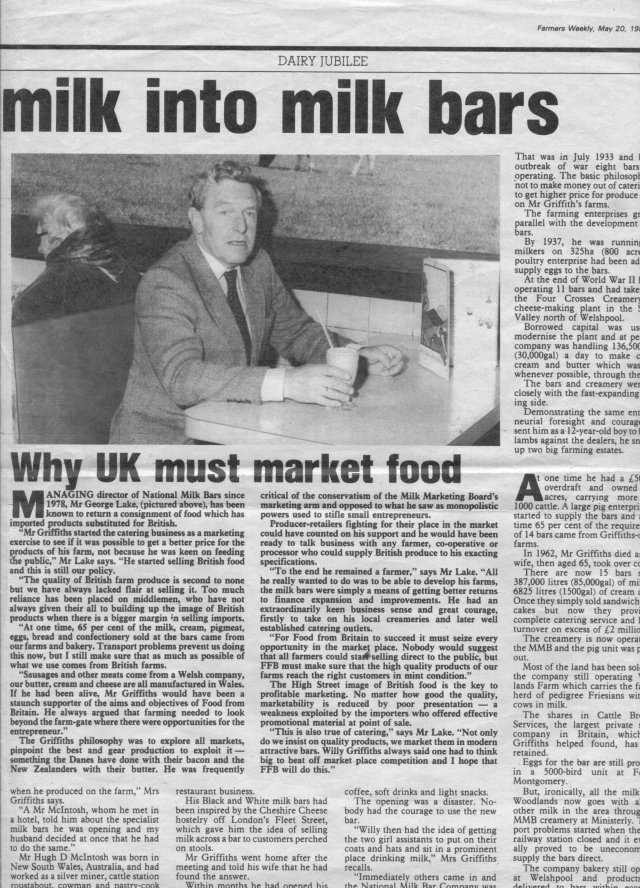
when he produced on the farm,” Mrs Griffiths says.
“A Mr McIntosh, whom he met in a hotel, told him about the specialist milk bars he was opening and my husband decided at once that he had to do the same.”
Mr Hugh D McIntosh was born in New South Wales, Australia, and had worked as a silver miner, cattle station roustabout, cowman and pastry-cook […] restaurant business.
His Black and White milk bars had been inspired by the Cheshire Cheese hostelry off London’s Fleet Street, which gave him the idea of selling milk across a bar to customers perched on stools.
Mr Griffiths went home after the meeting and told his wife that he had found the answer.
Within months he had opened his […] coffee, soft drinks and light snacks.
The opening was a disaster. Nobody had the courage to use the new bar.
“Willy then had the idea of getting the two girl assistants to put on their coats and hats and sit in a prominent place drinking milk,” Mrs Griffiths recalls.
“Immediately others came in and the National Milk Bar Company was […]
(last column too incomplete to transpose)
Managing director of National Milk Bars since 1978, Mr George Lake (pictured above), has been known to return a consignment of food which has imported produce substituted for British.
“Mr Griffiths started the catering business as a marketing exercise to see if it was possible to get a better price for the products of his farm, not because he was keen on feeding the public,” Mr Lake says. “He started selling British food and this is still our policy.
“The quality of British farm produce is second to none but we have always lacked flair at selling it. Too much reliance has been placed on middlemen, who have not always given their all to building up the image of British products when there is a bigger margin in selling imports.
“At one time, 65 percent of the milk, cream, pigmeat, eggs, bread and confectionery sold at the bars came from our farms and bakery. Transport problems prevent us from doing this now, but I still make sure that as much as possible of what we use comes from British farms.
“Sausages and other meats come from a Welsh company, our butter, cream and cheese are all manufactured in Wales. If he had been alive, Mr Griffiths would have been a staunch supporter of the aims and objectives of Food from Britain. He always argued that farming needed to look beyond the farm-gate where there were opportunities for the entrepreneur.”
The Griffiths philosophy was to exp[lore all markets, pinpoint the best and gear production to exploit it – something the Danes have done with their bacon and the New Zealanders with their butter. He was frequently critical of the conservatism of the Milk Marketing Board’s marketing arm and opposed to what he saw as monopolistic powers used to stifle small entrepreneurs.
Producer-retailers fighting for their place in the market could have counted on his support and he would have been ready to talk business with any farmer, co-operative or processor who could supply British produce to his exacting specifications.
“To the end, he remained a farmer,” says Mr Lake. “All he really wanted to do was to be able to develop his farms, the milk bars were simply a means of getting better returns to finance expansion and improvements. He had an extraordinarily keen business sense and great courage, firstly to take on his local creameries and later well established catering outlets.
“For Food from Britain to succeed it must seize every opportunity in the market place. Nobody would suggest that all farmers could start selling direct to the public, but FFB must make sure that the high quality products of our farms reach the right customers in mint condition.
The High Street image of British food is the key to profitable marketing. No matter how good the quality, marketability is reduced by poor presentation- a weakness exploited by the importers who offered effective promotional material at point of sale.
“This is also true of catering,” says Mr Lake. “Not only do we insist on quality products, we market them in modern attractive bars. Willy Griffiths always said one had to think big to beat off market place competition and I hope that FFB will do this.”